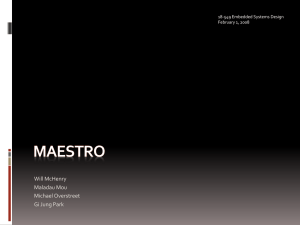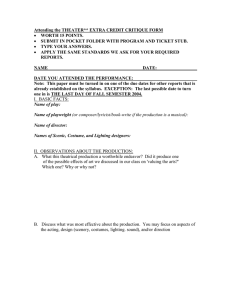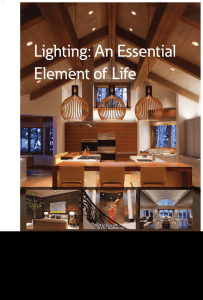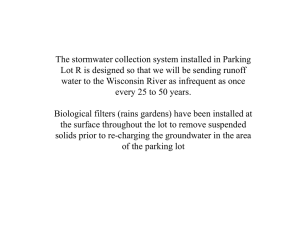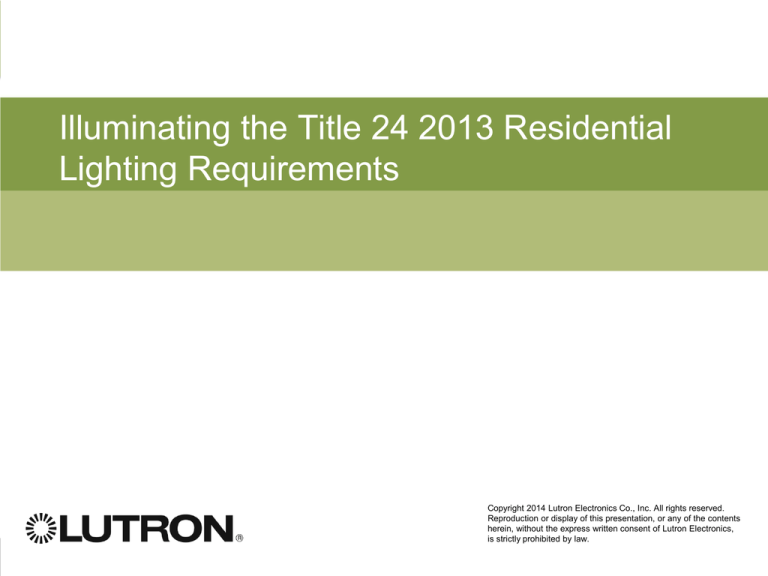
Illuminating the Title 24 2013 Residential
Lighting Requirements
Copyright 2014 Lutron Electronics Co., Inc. All rights reserved.
Reproduction or display of this presentation, or any of the contents
herein, without the express written consent of Lutron Electronics,
is strictly prohibited by law.
Illuminating Title 24 2013 Residential Lighting Requirements
1
This presentation is protected by US and International
Copyright laws. Reproduction, distribution, display and
use of the presentation without written permission of the
speaker is prohibited.
© Lutron Electronics Co., Inc. 2014
Illuminating Title 24 2013 Residential Lighting Requirements
2
Agenda
• Big picture energy use
• How lighting controls save energy
• What’s new in Title 24 2013 for residential lighting
• Key mandatory residential lighting requirements in
Title 24 2013
• Q&A
Illuminating Title 24 2013 Residential Lighting Requirements
3
Big picture – world energy usage
World energy consumption
is projected to increase by
44 percent from 2006 to
2030
Sources: U.S. Department of Energy
Illuminating Title 24 2013 Residential Lighting Requirements
4
Big picture – U.S. energy usage
Illuminating Title 24 2013 Residential Lighting Requirements
5
Big picture – U.S. vs. California energy usage
Illuminating Title 24 2013 Residential Lighting Requirements
6
Big picture – Residential energy usage
Consumption by end-use (residential)
Source: EIA 2009 RECS Survey
http://www.eia.gov/consumption/residential/reports/2009/state_briefs/pdf/ca.pdf
Illuminating Title 24 2013 Residential Lighting Requirements
7
Light control saves energy
Primary ways light control saves
energy:
1. Reduces operating hours
(switching off)
2. Reduce watts used when lights
are on (dimming)
3. Reduces cooling load
4. Maximizes effective use of sunlight
Fluorescent dimming curve
100
90
80
70
60
50
40
30
20
10
0
0
10
20
30 40
50
60 70
80
90 100
Light (%)
Illuminating Title 24 2013 Residential Lighting Requirements
8
Light control saves energy
Illuminating Title 24 2013 Residential Lighting Requirements
9
Energy codes – Title 24
CA 2013 Building Energy Efficiency
Standards
Title 24, Part 6 is California’s energy
efficiency code
Effective July 1, 2014
Effects all newly constructed or altered
commercial and residential buildings
Interior and exterior lighting requirements
Many consider Title 24 to be the strictest
energy code in the country
Illuminating Title 24 2013 Residential Lighting Requirements
10
What’s new?
Key new items for residential lighting:
Clarification of high efficacy vs. low efficacy lighting
Night lights (≤ 5 W) don’t have controlled with
vacancy sensors
Slight modifications to kitchen lighting
Bathrooms must have at least 1 high efficacy
luminaire.
Vacancy sensors* are now required in garages,
laundry rooms, closets, and utility rooms (along with
HE lighting).
*Note: Vacancy sensors cannot be convertible
to regular occupancy sensors to comply with
residential Title 24 2013 requirements.
Illuminating Title 24 2013 Residential Lighting Requirements
11
High efficacy lighting [Table 150.0A]
Pin-based linear
fluorescent or CFLs
Pulse-start metal halide
GU-24 sockets for CFLs or LEDs
LED light sources
High pressure sodium lamps
Induction lamps
Illuminating Title 24 2013 Residential Lighting Requirements
12
High efficacy lighting [Table 150.0B]
Illuminating Title 24 2013 Residential Lighting Requirements
13
Low efficacy lighting [Table 150.0A]
Sockets capable of using incandescent lamps.
Screw-based CFL and screw-based LEDs.
Mercury vapor lamps.
Lighting systems which allows the addition or
relocation of luminaires without altering the
wiring of the system.
LED light sources which have not been
certified to the CEC.
Lighting systems that allow conversion
between high-efficacy and low-efficacy lighting
without changing the luminaires’ housing or
wiring.
Electrical boxes finished with a blank cover.
Illuminating Title 24 2013 Residential Lighting Requirements
14
Switching devices and controls [150(k)2]
High-efficacy luminaires must be
switched separately from lowefficacy luminaires
Exhaust fans must be switched
separately from lighting systems
Luminaires must be switched with
readily accessible controls that
permit manual on / off switching
No controls may bypass a dimmer
or vacancy sensor function
Illuminating Title 24 2013 Residential Lighting Requirements
15
Lighting in kitchens [150(k)3]
A minimum of 50% of the total rated
wattage of permanently installed lighting
in kitchens must be high-efficacy
lighting.
Exceptions:
Up to 50 watts for dwelling ≤ 2,500
ft² or 100 watts for dwelling units >
2,500 ft² may be exempt from the
50% high efficacy requirement when
all lighting in the kitchen is controlled
by vacancy sensors or dimmers.
Illuminating Title 24 2013 Residential Lighting Requirements
16
Lighting internal to cabinets [150(k)4]
Lighting in cabinets can use up 20W
of lighting per linear foot of cabinet.
Cabinet length measured by one of
the following:
One horizontal length of
illuminated cabinet; or
One vertical length, per
illuminated cabinet section; or
No more than one vertical length
per every 40 horizontal inches of
illuminated cabinet.
Illuminating Title 24 2013 Residential Lighting Requirements
17
Lighting in bathrooms [150(k)5]
At least one high-efficacy
luminaire in each bathroom.
All other lighting must be
high efficacy or controlled
by vacancy sensors.
Illuminating Title 24 2013 Residential Lighting Requirements
18
Lighting in garages, laundry rooms, and utility rooms
[150(k)6]
Lighting installed in attached
and detached garages,
laundry rooms, and utility
rooms shall be high efficacy
luminaires and controlled by
vacancy sensors.
Illuminating Title 24 2013 Residential Lighting Requirements
19
Lighting in all other rooms (living rooms, TV rooms,
bedrooms, hallways, etc.) [150(k)7]
Lighting installed all other rooms shall be
high efficacy, or shall be controlled by
either dimmers or vacancy sensors.
Exceptions:
Luminaires in closets less than 70 ft2
Lighting in detached storage buildings
less than 1,000 square feet
Illuminating Title 24 2013 Residential Lighting Requirements
20
Outdoor lighting [150(k)9]
For single-family residential buildings, outdoor
lighting must be high efficacy or controlled by all of
the following:
A manual on / off switch.
A motion sensor
A photocontrol, astronomical time clock, or
energy management control system that
automatically turns the outdoor lighting off during
daylight hours.
Illuminating Title 24 2013 Residential Lighting Requirements
21
More information on energy codes
Lutron energy codes website: www.lutron.com/energycodes
Illuminating Title 24 2013 Residential Lighting Requirements
22
Questions?
Illuminating Title 24 2013 Residential Lighting Requirements
23

